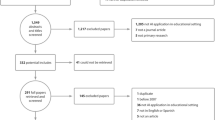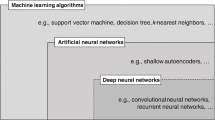Abstract
The consulting system OSWI—Orientating System for Economy and Computer Science—has been developed by commission of the Faculty of Economy and Computer Science of the University of Duisburg-Essen. The system is based on the characteristics and expected abilities for the different courses of study of the faculty, which were formulated by the professors as representatives of their respective fields. The algorithmic base of the system is a new self-organized learning neural network that has been developed by us, namely the self-enforcing network. OSWI has been used, at present, by more than 5,000 students and pupils and was always evaluated by the users as a very useful and user-friendly system for selecting among the faculty’s courses. The methodical approach for obtaining the database of the system and the algorithm with which OSWI operates is both highly innovative and very well suited for other areas.




Similar content being viewed by others
Notes
OSWI = Orientierungssystem für Wirtschaftswissenschaften und Informatik. http://www.cobasc.de/softcomputing/content/view/138/55/ (German Version).
Our methodical approach has a very slight similarity to that of Marivate et al. (2008) that compares key words of certain lectures with general interests of the students.
The representation of such a database in form of a matrix was already done by Ritter and Kohonen (loc. cit.); the term “semantical matrix” is from us.
One of the systems we tested just stated flatly without any explanation that the tester, one of the authors, was not suited for any course at the particular university that had developed this system. Fortunately the tester had already successfully finished his studies several years ago.
References
Chatti MA, Dyckhoff AL, Schroeder U, Thüs H (2012) A reference model for learning analytics. Int J Technol Enhanc Learn 4(5/6):318–331
Dehuri S, Patra MR, Misra BB, Jagadev AK (eds) (2013) Intelligent techniques in recommendation system: contextual advancements and new methods. IGI Global, USA
Hachmeister C-D, Harde ME, Langer MF (2007) Einflussfaktoren der Studienentscheidung. Eine empirische Studie von CHE und Einstieg, Gütersloh, CHE
Klüver C (2012) Solving problems of project management with a self enforcing network (SEN). In: Klüver C, Klüver J, (eds) Social-cognitive complexity, computational models and theoretical frames. Special issue of CMOT (computation and mathematical organizational theory), vol 18 Nr 2. Springer, Dordrecht, NL, pp 175–192
Klüver J, Klüver C (2011) Social understanding: on hermeneutics, geometrical models and artificial intelligence. Springer, Dordrechtm, NL
Klüver C, Klüver J (2013) Self-organized learning by Self-Enforcing Networks. In: Rojas I, Joya G, Cabestany J (eds) IWANN 2013, Part I, LNCS 7902. Springer, Berlin, pp 518–529
Marivate VN, Ssali G, Marwala T (2008) An intelligent multi-agent recommender system for human capacity building. In: Proceedings of the 14th IEEE Mediterranean Electrotechnical Conference, pp 909–915, 13 June 2008
Ritter H, Kohonen T (1989) Self-organizing semantic maps. Biol Cybern 61:241–254
Author information
Authors and Affiliations
Corresponding author
Rights and permissions
About this article
Cite this article
Klüver, C., Klüver, J. & Zurmaar, B. OSWI: a consulting system for pupils and prospective students on the basis of neural networks. AI & Soc 30, 23–30 (2015). https://doi.org/10.1007/s00146-014-0542-y
Received:
Accepted:
Published:
Issue Date:
DOI: https://doi.org/10.1007/s00146-014-0542-y




